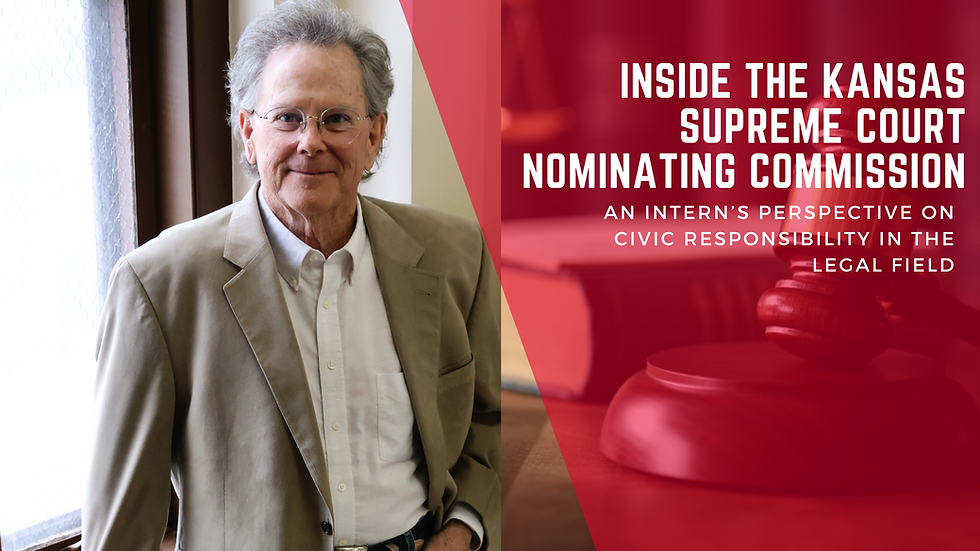Inside the Kansas Supreme Court Nominating Commission: An Intern’s Perspective on Civic Responsibility in the Legal Field
- pharding24
- Aug 3, 2025
- 2 min read
Updated: Aug 31, 2025

This summer marked my first hands-on experience working in the legal field—and it’s been nothing short of phenomenal. As a summer intern at Kennedy Berkley, I’ve had the opportunity to learn from an incredible group of attorneys who are not only experts in their practice areas but are also deeply committed to mentoring the next generation of legal professionals.
One of the most memorable conversations I’ve had during my time here was with Bob Frederick, who recently served on the Kansas Supreme Court Nominating Commission. We sat down to talk about his experience—and I left the conversation with a new perspective on the legal profession, civic duty, and what it really means to serve with integrity.
Bob began with a smile and a bit of a laugh: “It was a ton of paper.” And honestly? That tracks.
He walked me through the deeply thorough and merit-based process of reviewing candidates for the Kansas Supreme Court. It involved everything from writing samples and social media reviews to letters of recommendation—some applicants had over 20—to credit checks and personal interviews. Each team on the Commission was assigned a specific group of applicants to evaluate in detail. As Bob put it, it was like digging into “everything you wanted to know but were afraid to ask.”
What struck me the most was how seriously the Commission took its role—and how thoughtful and respectful the process was. Bob emphasized that every applicant was incredibly qualified. “Seven or eight of them would’ve made superb justices,” he told me. “The rest weren’t unqualified—you were just narrowing in on the best of the best.”
He also addressed a common misconception: that commissions like this are made up of elites or political insiders. “That’s just not who we were,” he said. The Commission was a group of everyday Kansans—legal professionals with a deep sense of duty—who stepped up to do the hard work. Politics, he told me, never entered the room. Not once. The conversations were centered on qualifications, temperament, judicial writing ability, and finding the right fit for the Court—not whether someone fit a certain political narrative.
Bob also shared that some were concerned changes to Kansas statute might discourage applicants. But that didn’t happen. Instead, they were met with an incredibly strong and diverse pool of lawyers—smart, civic-minded professionals who weren’t in it for attention or power, but to serve.
When I asked Bob if this experience changed how he views his role as a lawyer, he didn’t hesitate. “It didn’t change my perspective—but it reinforced it,” he said. The merit-based selection process matters, and it works. And as members of the legal profession, we have a responsibility to stay involved in civic work. “If we don’t,” he said, “who will?”
That stuck with me.
Closing Reflection
As a law student just beginning my career, it’s been incredible to witness the real-world impact attorneys can have—not just in the courtroom, but in shaping our judicial system, our communities, and our future. This conversation with Bob reminded me that the work we do in law is never just about statutes or procedures. It’s about service, integrity, and showing up—especially when it counts.
Written by: Abby Harding
.png)


